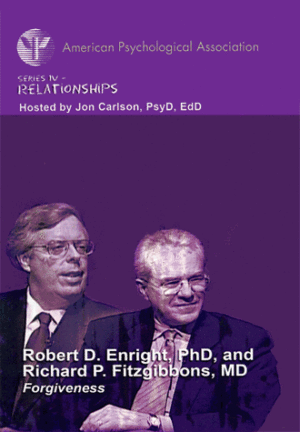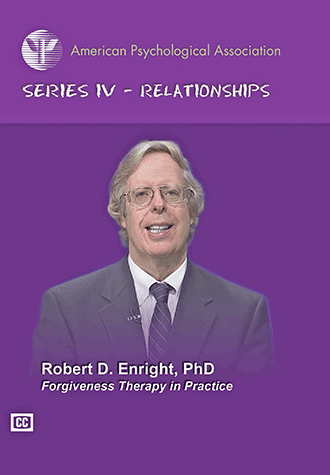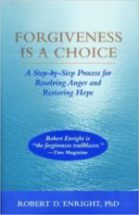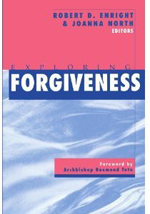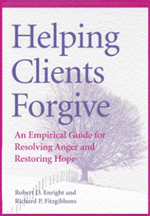Counselors, Psychotherapists and Other Helping Professionals
We have witnessed an explosion of interest in forgiveness therapy since the mid-1990s.
Here are the reasons why…
- The scientific evidence of forgiveness therapy is strong.
- The approach can be placed into almost any existing therapeutic mode (psychoanalysis, cognitive behavioral therapy, humanism, social learning, and so forth). Our model of forgiveness therapy is flexible and therefore adaptable to any of the therapeutic models above.
- Forgiveness targets unhealthy anger, which is often a component of a variety of diagnoses in the Diagnostic and Statistical Manual of Mental Disorders. Helping a client or patient to reduce or even eliminate anger may ameliorate other symptoms, such as anxiety and even depression. Our research bears this out as do our case studies in the groundbreaking book Forgiveness Therapy.
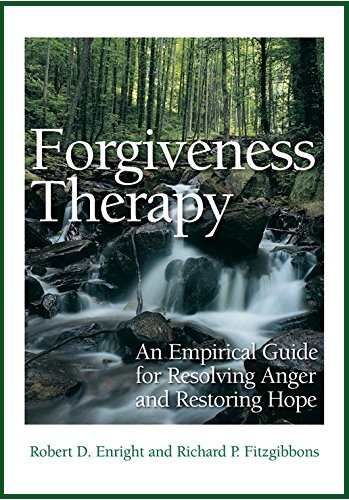
Despite those positive realities, some clients remain confused regarding the meaning of forgiveness. To help practitioners provide clarity, here is an article that examines the likely errors clients may bring to counseling – Clearing Up Client Confusion Regarding the Meaning of Forgiveness: An Aristotelian/Thomistic Analysis with Counseling Implications (Counseling and Values, October 2014).
In that article, Dr. Enright concludes that client misunderstanding and the resultant fear of attempting to forgive are often rooted not in understanding forgiveness itself, but instead in focusing on 1 of 2 vices surrounding that construct. He encourages practitioners to bring this misunderstanding directly to clients so that they can better decide for themselves whether or not to forgive others. He also provides six specific recommendations designed to bring the kind of clarity at the beginning of forgiveness counseling sessions that can better serve both the client and the counselor.
Training Materials
- Forgiveness – This 100-minute training video (in DVD and VHS formats) is available from the (APA). Drs. Robert Enright and Richard Fitzgibbons discuss and demonstrate their forgiveness-centered approach to psychotherapy.
- Forgiveness Therapy in Practice – In this 100-minute video program, Dr. Enright demonstrates his approach to forgiveness therapy with a female client who feels hurt by her mother.
- Forgiveness Therapy: An Empirical Guide for Resolving Anger and Restoring Hope – We recommend this book by Dr. Robert Enright and Dr. Richard Fitzgibbons, published by the American Psychological Association (APA) in 2015, to all helping professionals who desire more depth in exploring the relatively-new science of forgiveness, discovering how forgiveness therapy works, and learning from real-life case studies. Scroll down for an overview of our online, home study continuing education course that is certified by the APA and which offers 15 CEU credits to licensed psychologists.
Online Continuing Education Course
Forgiveness Therapy – This course is based on the book by the same title. Course work includes the empirical foundations of forgiveness therapy, process models of forgiveness interventions, and the clinical application of forgiveness in a variety of clinical presentations.
The course offers 15 CEU credits to licensed psychologists (through the APA) but has also proven beneficial for ministers, psychiatrists, social workers, nurses, and other professional counselors who have completed it. In addition to the Forgiveness Therapy text, students gain insight from an instructor-prepared Content Summary that accompanies each unit of the text; Read the Unit 1 Content Summary.
The course was written and continues to be run by doctoral scholar-practitioners affiliated with the IFI. View the full CV of Forgiveness Therapy faculty members: 1) Dr. Robert Enright; and, 2) Dr. Elizabeth Gassin.
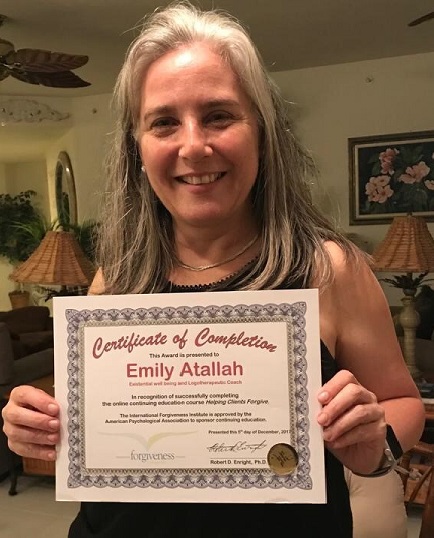
Emily Atallah with her Forgiveness CE Course Certificate of Completion.
Read a compelling review of the IFI’s CE Course written by Emily Atallah, an existential logotherapeutic coach who has incorporated forgiveness into her daily therapy sessions.
“My time studying at the Forgiveness Institute gave me more tools
to better treat my clients, to measure their progress, and
to encourage them to strive for a better and more meaningful life.”
Emily Atallah, Coach de Vida – Life Coach
Online Continuing Education Course
Additional Training Materials
- Forgiveness is a Choice: A Step-by-Step Process for Resolving Anger and Restoring Hope – This book by Dr. Robert Enright can be used as a treatment manual for the client or patient.
- Exploring Forgiveness – This book is a powerful collection of essays with an interdisciplinary focus that offers a comprehensive view of conceptual, theoretical, and practical issues on the topic of forgiveness. It is edited by Drs. Robert Enright and Joanna North with a Foreword by Archbishop Desmond Tutu.
- Helping Clients Forgive – This book, published in 2000, is the first collaborative effort of Dr. Enright and Dr. Richard Fitzgibbons. The book includes the empirical foundations of forgiveness therapy, process models of forgiveness interventions, and the clinical application of forgiveness in a variety of clinical presentations such as depressive and anxiety disorders, substance abuse, eating disorders, and marital and family adjustment disorders.
Research Tools
- Enright Forgiveness Inventory (EFI) – The EFI is a 60-item scale that takes only 12-15 minutes for a client or patient to fill out. The
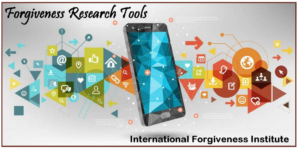 person first identifies one individual who has hurt him or her to a great extent. The client then describes the one incident of injustice, which is followed by the 60 items. The scale gives a score in the range of 60 (low forgiveness) to 360 (this person is a saint, no doubt about it!!). The scale is available from the publishing house, Mind Garden, at www.mindgarden.com. A scoring manual is available or Mind Garden will do the scoring and provide a complete client profile.
person first identifies one individual who has hurt him or her to a great extent. The client then describes the one incident of injustice, which is followed by the 60 items. The scale gives a score in the range of 60 (low forgiveness) to 360 (this person is a saint, no doubt about it!!). The scale is available from the publishing house, Mind Garden, at www.mindgarden.com. A scoring manual is available or Mind Garden will do the scoring and provide a complete client profile. - Enright Forgiveness Inventory for Children (EFI-C) – The EFI for Children is a 30-item scale similar to the 60-item adult version. It is presented orally and assesses a child’s degree of forgiveness toward one person for one hurtful event. The children’s version is available from the International Forgiveness Institute here. The EFI-C is now available in the Urdu language. Contact the IFI Director for more information.
- The Enright Self-Forgiveness Inventory (ESFI) is based on the conceptualization of forgiveness as a moral virtue. The ESFI is a 30-item scale featuring six subscales with five items each (positive and negative affect toward the self, positive and negative thoughts toward the self, and positive and negative behavior toward the self). Five additional items at the end of the scale allow for measurement of pseudo self-forgiveness (PSF).
Journal Articles
Dr. Enright’s forgiveness research at the University of Wisconsin-Madison stretches back more than 25 years and includes more than 100 publications. Read the abstracts of 34 of his journal articles, some of which are peer-reviewed experimental studies, in which people forgive or are forgiven. Learn more about his research work with targeted subjects including incest survivors, cardiac patients, terminally ill elderly cancer patients, at-risk middle and high school students, and others on our Research Page.
Speakers Bureau
Please contact our Director to schedule Dr. Enright or another of our forgiveness specialists for your conference or event.
Blogs and News
We work to constantly update our materials. Please see the “Blogs and News” section of this website for the latest updates. If you have an idea or request for a forgiveness-related item you can’t find on our website, contact us.
Become a “Peace Builder” by signing The Forgiveness Pledge.

